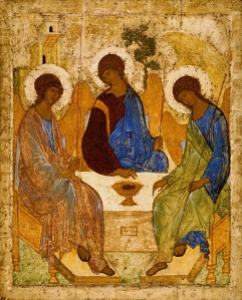Setting aide the rest of the article, here is the writer’s central distinction: “Americans fall into two basic camps. Those with a more ‘egalitarian’ and ‘communitarian’ mind-set …. In contrast, people with a ‘hierarchical’ and ‘individualistic’ mind-set …”
The author said he prefers the first camp and went on to present a biblical argument for it. And although I strongly lean in that direction, I couldn’t help but see a strong biblical argument for the second camp.
The scriptures present a strongly hierarchical view of things. The over-arching metaphor for God, after all, is King. And even the metaphors of Father and Shepherd have definite authority attached to them. And we see hierarchical/authoritarian roles approved in biblical human relationships as well. At the same time, the scriptures have a different expectation for those in authority than is generally experienced in the world we live in. Look at Matthew 20:25-28 —
Jesus called them together and said, “You know that the rulers of the Gentiles lord it over them, and their high officials exercise authority over them. Not so with you. Instead, whoever wants to become great among you must be your servant, and whoever wants to be first must be your slave — just as the Son of Man did not come to be served, but to serve, and to give his life as a ransom for many.”
Something else is a play here which I’ll get to later on. But suffice it to say for now, we have both greatness and service taking place at the same time. The either/or isn’t on Jesus’ agenda.
Similarly, I have to push back against the anti-individual comments that the author made. He made excellent arguments for the role of community in faith and worship. But he did so at the expense of the individual.
When God speaks to Abraham in Exodus 3:6, he says “I am the God of your father, the God of Abraham, the God of Isaac and the God of Jacob.” He’s not just God to them collectively. He’s God to them each individually.
Thomas Cahill, in his book The Gift of the Jews, suggests that Abraham was the first individual in human history. Before Abraham, no one person was uniquely addressed by any god. But Yahweh establishes a unique, one-on-one relationship with Abraham, opening the way for all humans to do so and establishing the value of the individual before God.
And yet, when it comes to the church, one of our strongest images is that of the body (Romans 12 and 1 Corinthians 12). We are each “members” of the the church in the way that our hands and legs are members of our bodies. There is unity without uniformity — not every member is exactly the same. There is diversity without division — no member is truly itself and alive without being attached to the rest.
So, what we’re left with is neither hierarchical nor egalitarian, neither individualist nor communitarian. What we’re left with is what Colin Gunton wrote about in his brilliant book on trinitarian theology The One, the Three and the Many.
When we emphasize the one (all people lumped into a single communal entity) as is done in the East, the individual is lost. When we emphasize the many (all people doing their own individual things for their own individual reasons) as is done in the West, the community is lost. But in the Trinity, we see an unbreakable unity that is expressed in three unique Persons. We affirm that God is One (as in the Shema of Deut. 6:4), but we baptized in the name of the Father and of the Son and of the Holy Spirit (Matt. 28:19). We see Jesus submitting to the Father and saying only what the Father tells him to say, and we see the Father glorifying the Son. There is authority and submission at the same time.
We all need to be treated as unique persons. But we also need to know ourselves within the context of community. We can’t pit the two against each other. We need unity without uniformity. We need diversity without division. This is how our God is and this is how he created us to be.
The problem is that we divide into camps. We choose a communitarian or an individualist approach and pass laws or establish systems that require it for others and find that they fail. We become rigidly hierarchical or shapelessly egalitarian in our decision making and find that neither serves us very well.
I love the image of King Arthur retaining his kingship but offering each knight an equal say at the Round Table.
I love Andrei Rublev’s icon of the Trinity in the Old Testament (1425-27) with each member dressed differently but nodding toward and open to one another. In it, the table open to us, the viewers, with the cup of communion beckoning us in. Uniqueness and unity both at home. Authority and mutual submission both in play.
The either/or approach to community vs. individual and equality vs. hierarchy is a disaster because it pits things against each other which need to be held in together in tension. The trinitarian approach to being human holds this tension together. It’s tough, but it’s what God’s people need to have as the goal we’re always moving toward.


